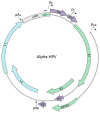Persistent Human Papillomavirus Infection
- PMID: 33672465
- PMCID: PMC7923415
- DOI: 10.3390/v13020321
Persistent Human Papillomavirus Infection
Abstract
Persistent infection with oncogenic human papillomavirus (HPV) types is responsible for ~5% of human cancers. The HPV infectious cycle can sustain long-term infection in stratified epithelia because viral DNA is maintained as low copy number extrachromosomal plasmids in the dividing basal cells of a lesion, while progeny viral genomes are amplified to large numbers in differentiated superficial cells. The viral E1 and E2 proteins initiate viral DNA replication and maintain and partition viral genomes, in concert with the cellular replication machinery. Additionally, the E5, E6, and E7 proteins are required to evade host immune responses and to produce a cellular environment that supports viral DNA replication. An unfortunate consequence of the manipulation of cellular proliferation and differentiation is that cells become at high risk for carcinogenesis.
Keywords: HPV; cancer; epithelium; extrachromosomal replication; immune evasion; latency; papillomavirus; persistence; tethering.
Conflict of interest statement
The authors declare no conflict of interest. The funders had no role in the writing of the manuscript, or in the decision to publish the review.
Figures






References
Publication types
MeSH terms
Substances
Grants and funding
LinkOut - more resources
Full Text Sources
Other Literature Sources

